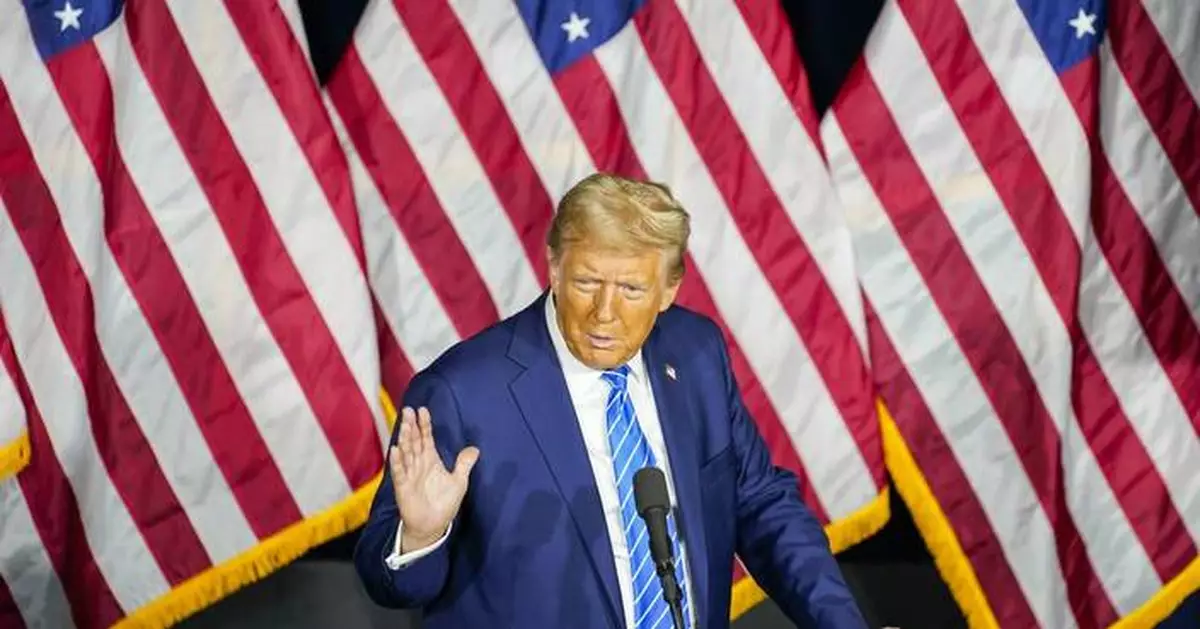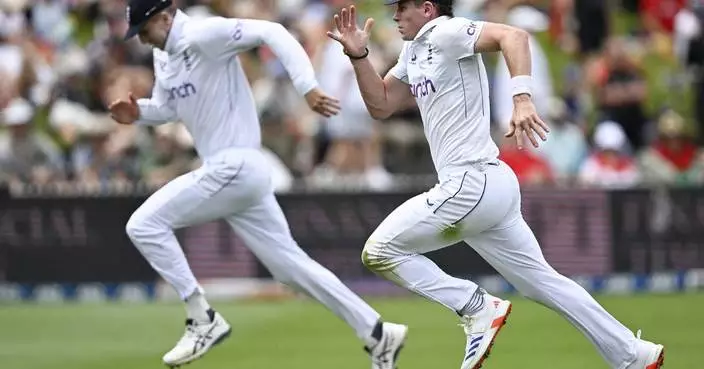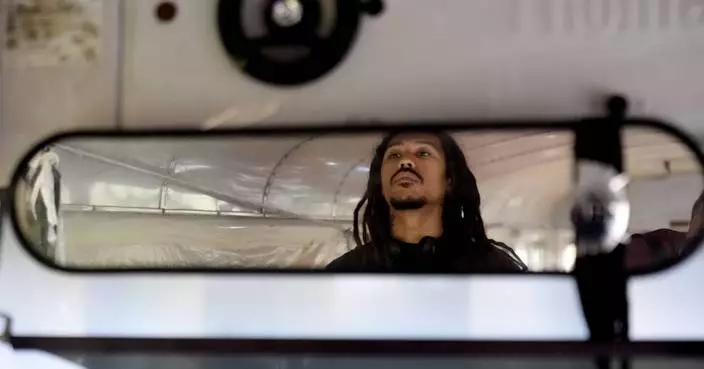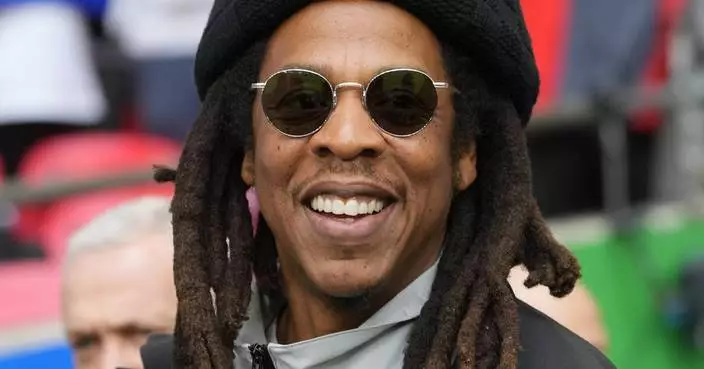WASHINGTON (AP) — Donald Trump “laid the groundwork for his crimes” well before Election Day in 2020. He said “the details don’t matter” when told his election fraud claims would fail in court. And his response to learning that then-Vice President Mike Pence was taken to a secure location as rioters stormed the Capitol?
“So what?”
That's according to a 165-page court filing from special counsel Jack Smith's team that paints a portrait of a president so desperate to cling to power that he “resorted to crimes" after losing the 2020 election to Democrat Joe Biden.
The filing unsealed Wednesday provides a glimpse into the evidence and testimony prosecutors plan to present if the case accusing Trump of an illegal scheme to overturn the 2020 election ever reaches trial.
The Republican presidential nominee has maintained that he did nothing illegal and has characterized the case as an attempt to hurt his bid to reclaim the White House in November. Trump's lawyers who have pushed to dismiss the case will now get a chance to respond in court to prosecutors' claims.
Here are some of the key passages from the filing:
Prosecutors allege Trump started laying the foundation for his illegal scheme well before election day, refusing to say in the months leading up to it whether he would accept the results and suggesting he could only lose if there was fraud.
Three days before the election, a Trump political adviser told a group of supporters that the then-president was “going to declare himself the winner” no matter the outcome," according to prosecutors.
“That doesn't mean he's the winner, he's just going to say he's the winner,” the adviser said.
Trump “did exactly that” immediately following the election, prosecutors said. Then, in the days following the election, Trump's allies “sought to create chaos” at polling places where votes were still being counted, Smith's team alleges.
When a campaign employee was told about a batch of votes in Detroit that appeared to be heavily in favor of President Joe Biden, the employee told a colleague to “find a reason” that wasn't right and “give me options to file litigation.”
When the colleague suggested there would be unrest, the campaign employee responded: “Make them riot” and “Do it!!!” according to the filing.
Prosecutors are trying to show that Trump knew his election fraud claims were bogus because many in his circle told him that there was no fraud and that he actually lost the election. Prosecutors say Trump disregarded those assurances just like he disregarded “dozens of court decisions that unanimously rejected his and his allies’ legal claims.”
In one key moment detailed in the filing, prosecutors say a lawyer who represented Trump during his first impeachment trial told Trump that his election fraud claims wouldn't survive in court. Trump responded: “The details don't matter,” according to prosecutors.
Prosecutors say they will introduce evidence that shows Trump and his allies “made up figures from whole cloth” about election fraud, detailing how they repeatedly changed their baseless claims on the numbers of noncitizens voting in Arizona.
One of the most illuminating sections of the filing details the relentless pressure campaign that Trump and his allies enlisted against Pence, beginning well before Election Day and running up to the final minutes of the Jan. 6, 2021, certification of President Joe Biden’s win.
Even as most of the details of the former president’s futile attempts to get his running mate to reject Biden’s electoral votes have been well documented, Smith’s latest brief gives an even more granular look at the breakdown between the two men as prosecutors say one sought desperately to cling on to power and the other fought to maintain his unwavering fidelity to the Constitution.
When news organizations, including The Associated Press, called the election for Biden on Nov. 7, Pence saw it as an opportunity to “encourage” Trump “as a friend,” reminding him that he “took a dying political party and gave it a new lease on life," prosecutors wrote. A few days later, when Trump and his allies were still strategizing ways to overcome the defeat, Pence again reiterated that the next presidential election in 2024 was “not so far off.”
When Pence refused on Dec. 28 to support the various legal cases being pursued by Trump and his close allies in Congress, the filing states that Trump told his vice president that “hundreds of thousands” of people “are gonna hate your guts” and “people are gonna think you’re stupid.” He added, “You’re too honest.”
This went on for days, until the two men met in person one last time before Jan. 6. The meeting in the Oval Office on the eve of the certification is seen by prosecutors as one of Trump’s last efforts to encourage Pence privately to keep him in power, telling him once again that he had “the power to decertify,” the results. “When Pence was unmoved, the defendant threatened to criticize him publicly,” the filing states. “I’m gonna have to say you did a great disservice,” Trump said. Pence relayed this comment to a member of his team who saw it as a direct threat “to the point that he alerted Pence’s Secret Service detail.
As Trump's supporters began attacking the Capitol on Jan. 6 to stop the counting of the electoral votes, an aide rushed in to tell Trump that Pence had been taken to a secure location. The aide was hoping Trump would “take action to ensure Pence's safety,” prosecutors wrote. Instead, Trump's only response was, “So what?" prosecutors allege.
Prosecutors say they will present “forensic evidence” from Trump's cellphone and testimony from witnesses to show how Trump spent the afternoon of Jan. 6 on Twitter and watching TV coverage of the riot while his aides pressed him to make a public statement to quell the violence.
“Instead, the defendant refused repeatedly until his advisors gave up and left him alone in the dining room,” prosecutors wrote.
Alone in the dining room, Trump then sent a Tweet attacking Pence for not having the “courage to do what should have been done to protect our Country and our Constitution, giving States a chance to certify a corrected set of facts, not the fraudulent or inaccurate ones which they were asked to previously certify.”
A rioter with a bullhorn read Trump's Tweet about Pence to the crowd that was trying to enter the Capitol, prosecutors said. It was only after advisers again urged Trump to do something about the riot that he sent a Tweet encouraging his supporters to support law enforcement and “stay peaceful," prosecutors wrote.
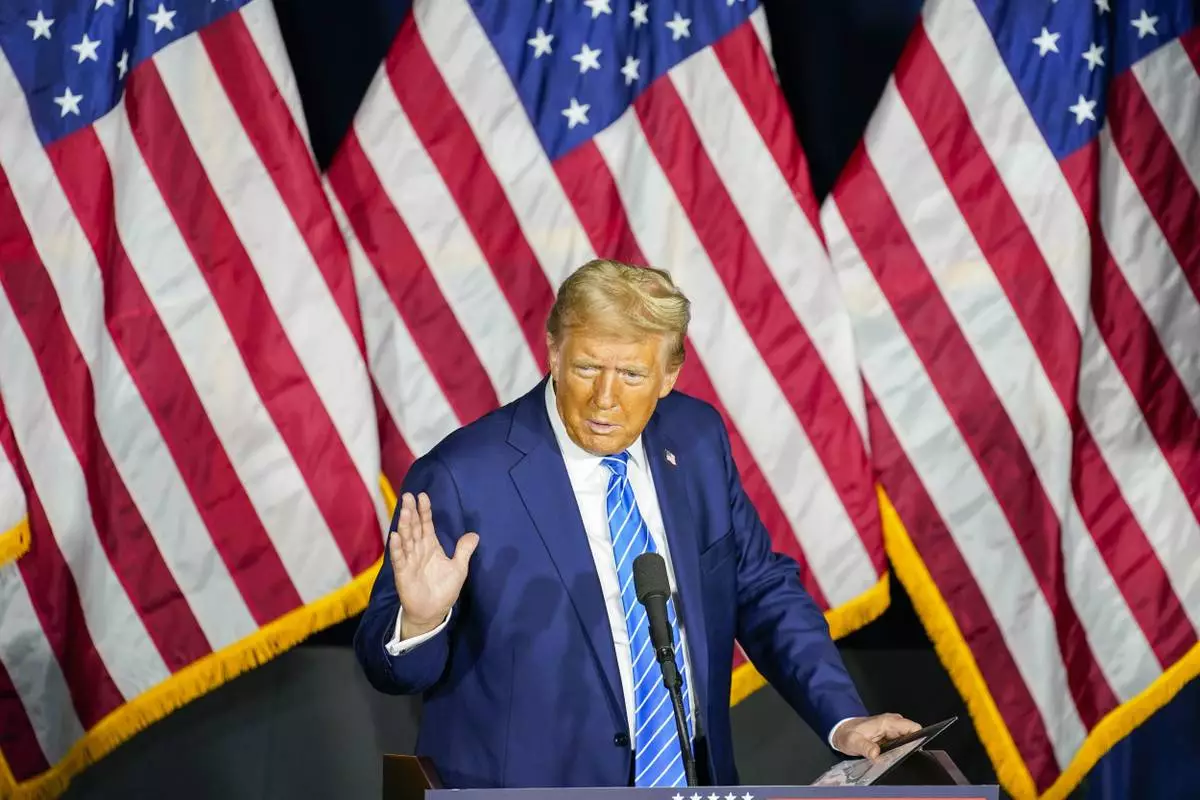
Republican presidential nominee former President Donald Trump speaks at a campaign event Tuesday, Oct. 1, 2024, at Discovery World in Milwaukee. (AP Photo/Andy Manis)
SEOUL, South Korea (AP) — Impeached South Korean President Yoon Suk Yeol said Saturday will “never give up” and called for officials to maintain stability in government functions during what he described as a “temporary” pause of his presidency.
Yoon released the comments through his office after the National Assembly passed a motion to impeach him over his short-lived martial law decree this month that harkened back to an era of authoritarian leaders the country has not seen since the 1980s.
Yoon had previously defended his step as an act of necessary governance and vowed to “fight to the end” in the face of opposition-led efforts to remove him from office. The parliamentary vote suspends his powers while he awaits a decision by the Constitutional Court whether to formally remove him from office.
THIS IS A BREAKING NEWS UPDATE. AP’s earlier story follows below.
SEOUL, South Korea (AP) — South Korea's parliament voted Saturday to impeach President Yoon Suk Yeol as authorities investigate allegations of rebellion over his controversial Dec. 3 martial law decree that has caused huge political turmoil in the country.
The National Assembly passed the motion 204-85 in a floor vote. Yoon’s presidential powers and duties will be suspended after the copies of a document on the impeachment are delivered to him and to the Constitutional Court.
The court has up to 180 days to determine whether to dismiss Yoon as president or restore his powers. If he’s thrown out of office, a national election to choose his successor must be held within 60 days.
It was the second National Assembly vote on Yoon's impeachment motion. Last Saturday, Yoon survived an impeachment vote after most ruling party lawmakers boycotted the floor vote. Some People Power Party lawmakers had since announced their intentions to vote for Yoon's impeachment in a second vote, as public protests against Yoon intensified and his approval rating plummeted.
Tens of thousands of people have braved the bitter cold and poured onto the streets of the capital, Seoul, every night for the past two weeks, calling for Yoon's ouster and arrest. They shouted slogans, sang, danced and waved K-pop light sticks. Smaller groups of Yoon's conservative supporters — still in the thousands — have also been rallying in Seoul, denouncing attempts to impeach the president. Both rallies have largely been peaceful.
Yoon’s martial law imposition, the first of its kind in more than four decades in South Korea, lasted only six hours, but has caused massive political tumult, halted diplomatic activities and rattled financial markets. Yoon was forced to lift his decree after parliament unanimously voted to overturn it.
After declaring martial law, Yoon sent hundreds of troops and police officers to the parliament to try to impede its vote on the decree before they withdrew after the parliament rejected it. No major violence occurred.
Opposition parties and many experts accuse Yoon of rebellion, citing a law clause that categorizes as rebellion the staging of a riot against established state authorities to undermine the constitution. They also say that by law a president in South Korea is allowed to declare martial law only during wartime or similar emergencies and has no rights to suspend parliament’s operations even under martial law.
The impeachment motion alleged that Yoon “committed rebellion that hurts peace on the Republic of Korea by staging a series of riots.” It said Yoon’s mobilization of military and police forces threatened the National Assembly and the public and that his martial law decree was aimed at disturbing the Constitution.
In a fiery speech on Thursday, Yoon rejected the rebellion charges, calling his martial law order an act of governance. The conservative Yoon said he aimed to issue a warning to the main liberal opposition Democratic Party, calling it “a monster” and “anti-state forces” that he argued has flexed its legislative muscle to impeach top officials and undermined the government’s budget bill for next year.
“I will fight to the end to prevent the forces and criminal groups that have been responsible for paralyzing the country’s government and disrupting the nation’s constitutional order from threatening the future of the Republic of Korea,” Yoon said.
Democratic Party leader Lee Jae-myung called Yoon’s speech a “mad declaration of war” against his own people.
The Democratic Party and five other opposition parties control the 300-member unicameral parliament with a combined 192 seats, but they were eight seats shy of the two-thirds majority needed to pass Yoon’s impeachment motion and needed support from ruling party lawmakers.
Yoon has been banned from leaving South Korea, as law enforcement authorities are investigating whether he and others involved in the martial law declaration committed rebellion, abuse of power and other crimes. If convicted, the leader of a rebellion plot can face the death penalty or life imprisonment.
Yoon has the presidential privilege of immunity from criminal prosecution but that doesn’t extend to allegations of rebellion or treason. Subsequently, Yoon could be investigated, detained, arrested or indicted over his martial law decree, but many observers doubt that authorities will forcefully detain him because of the potential for clashes with his presidential security service.
Yoon’s defense minister, police chief and the head of Seoul’s metropolitan police agency have been arrested over their roles in the martial law case. Other senior military and government officials also face investigations.
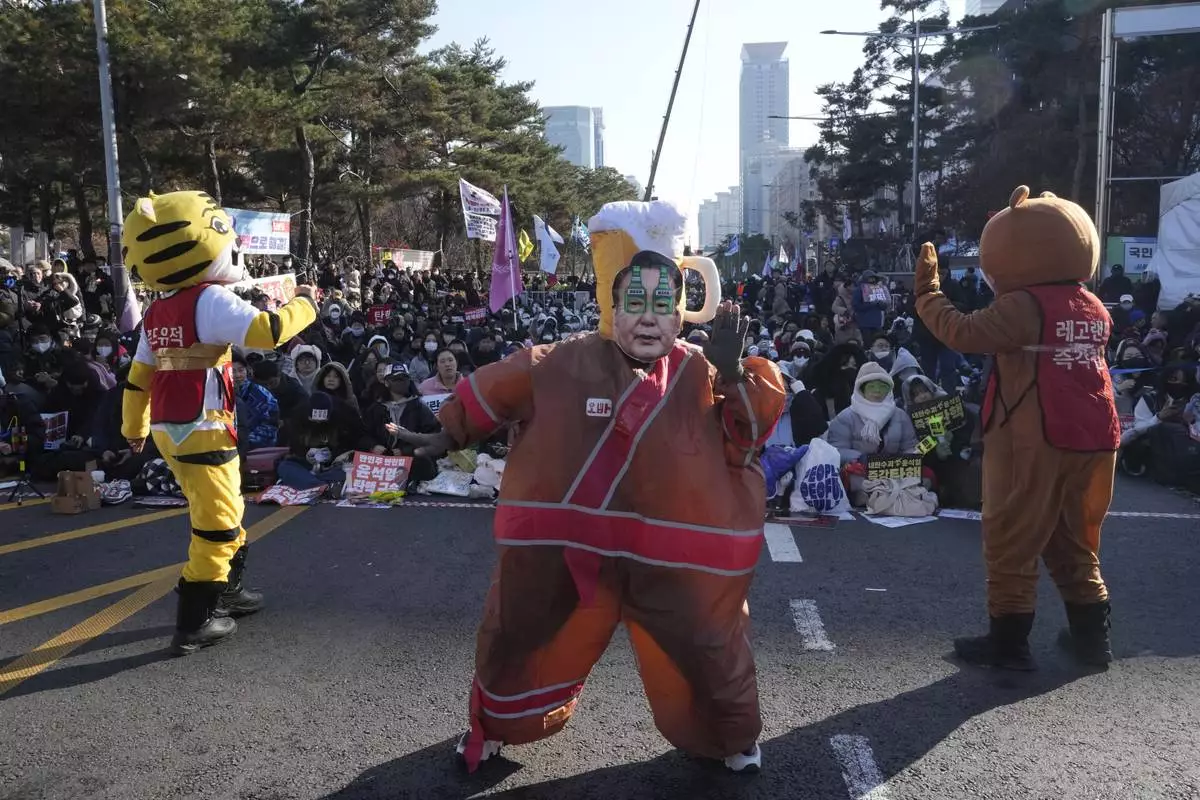
A participant, center, wearing a mask of South Korean President Yoon Suk Yeol performs before a rally to demand his impeachment outside the National Assembly in Seoul, South Korea, Saturday, Dec. 14, 2024. (AP Photo/Ahn Young-joon)
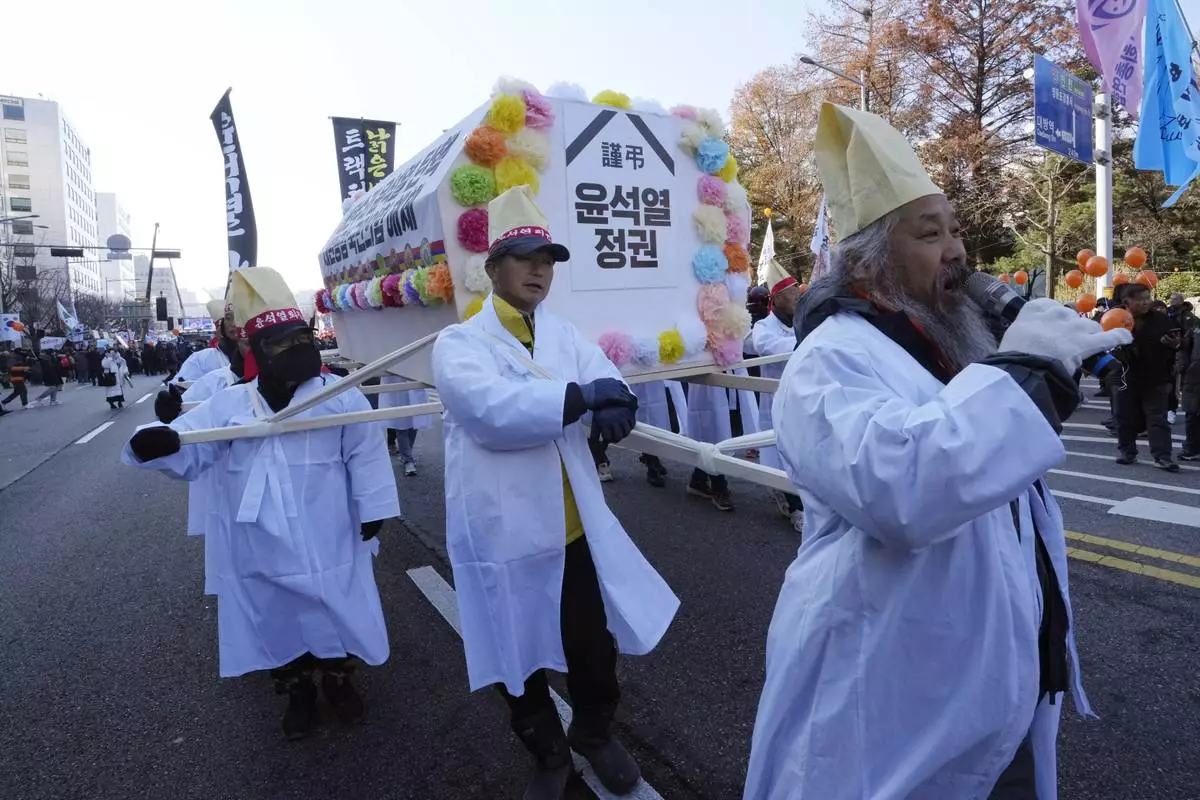
Farmers carry a coffin symbolizing South Korean President Yoon Suk Yeol's government before a rally to demand his impeachment outside the National Assembly in Seoul, South Korea, Saturday, Dec. 14, 2024. The signs read " Yoon Suk Yeol's government. " (AP Photo/Ahn Young-joon)
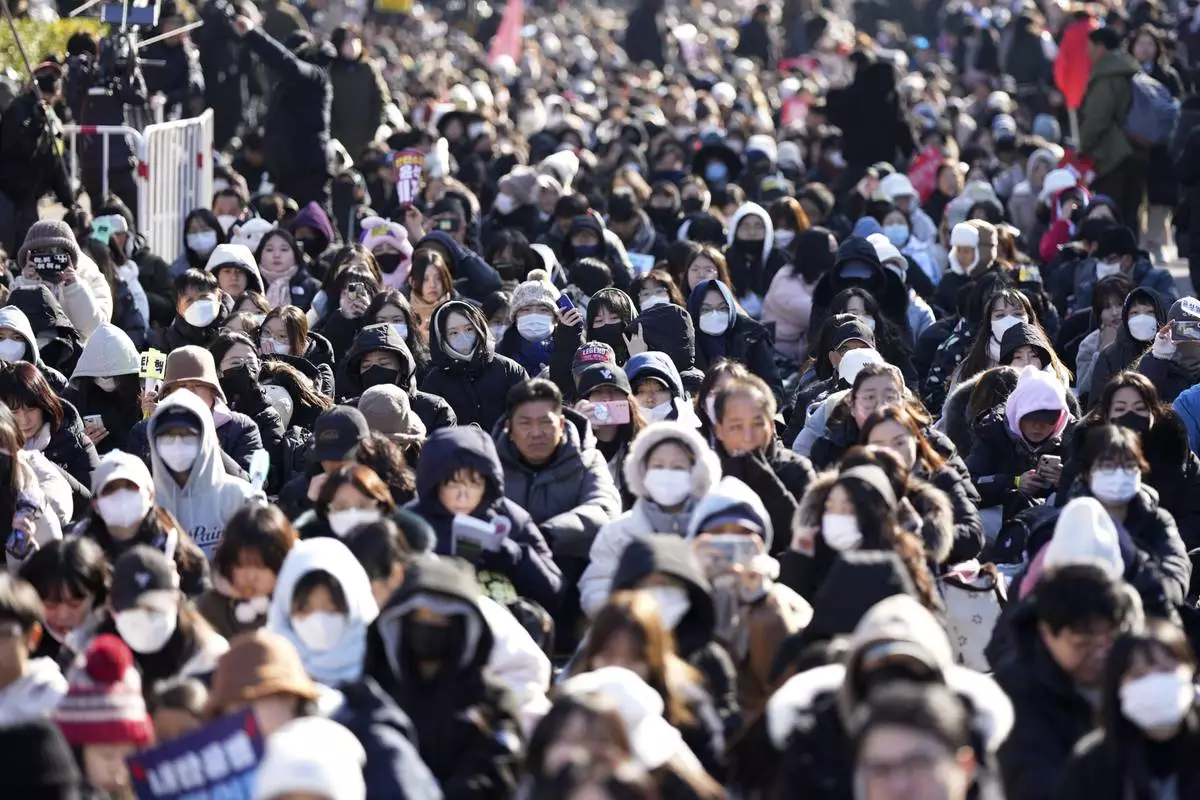
People wait before a rally to demand South Korean President Yoon Suk Yeol's impeachment outside the National Assembly in Seoul, South Korea, Saturday, Dec. 14, 2024. (AP Photo/Lee Jin-man)
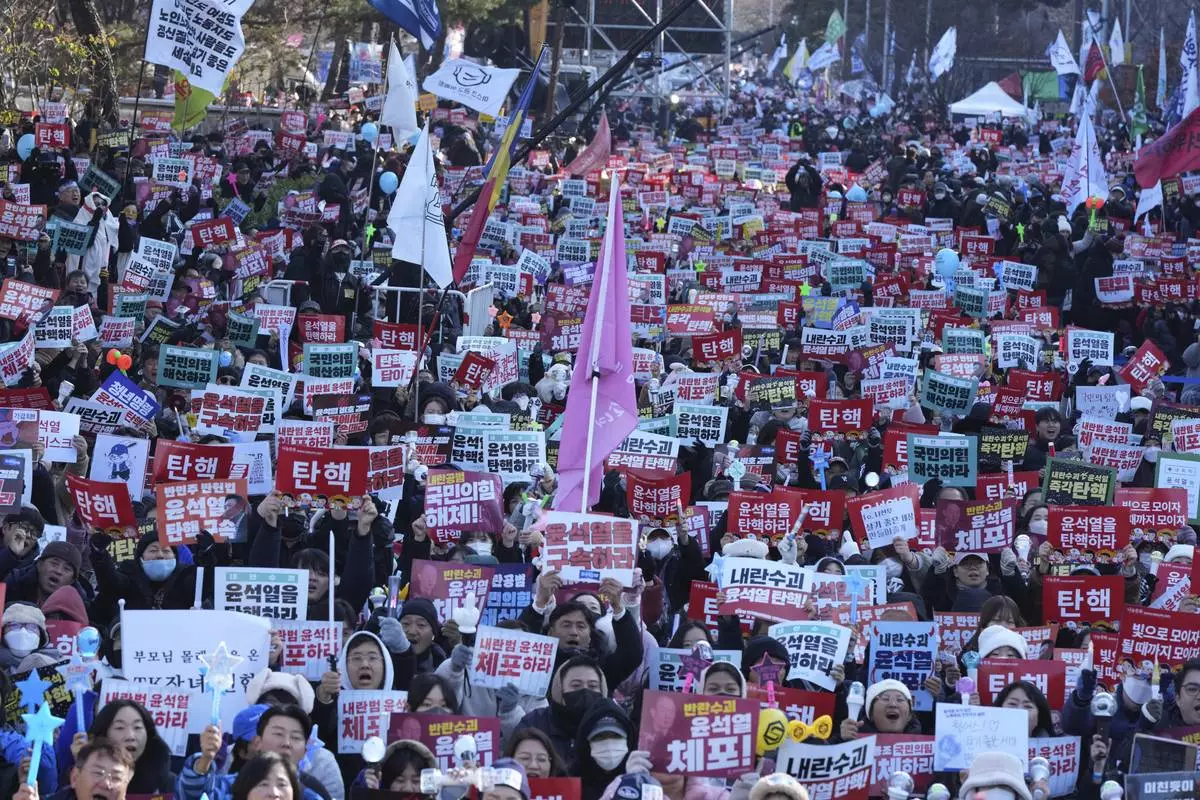
People hold signs before a rally to demand South Korean President Yoon Suk Yeol's impeachment outside the National Assembly in Seoul, South Korea, Saturday, Dec. 14, 2024. The letters read "Impeachment." (AP Photo/Lee Jin-man)
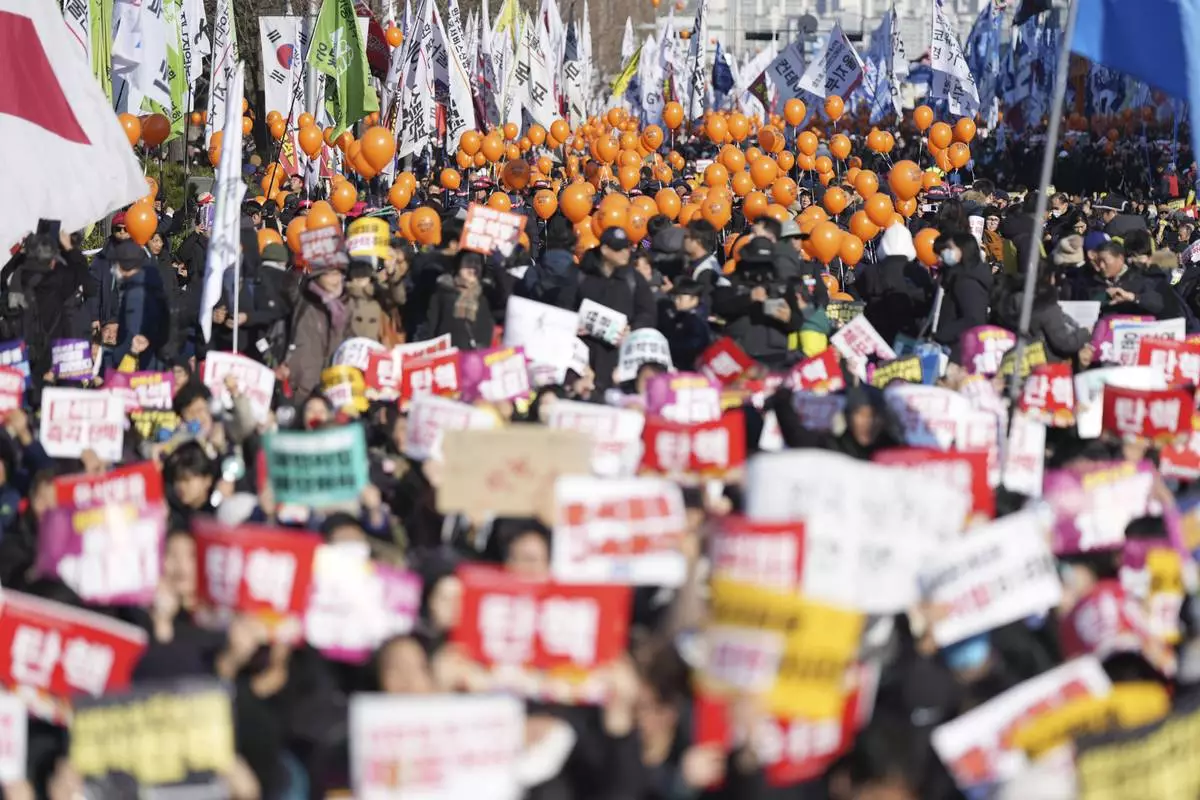
People march for a rally to demand South Korean President Yoon Suk Yeol's impeachment outside the National Assembly in Seoul, South Korea, Saturday, Dec. 14, 2024. (AP Photo/Lee Jin-man)
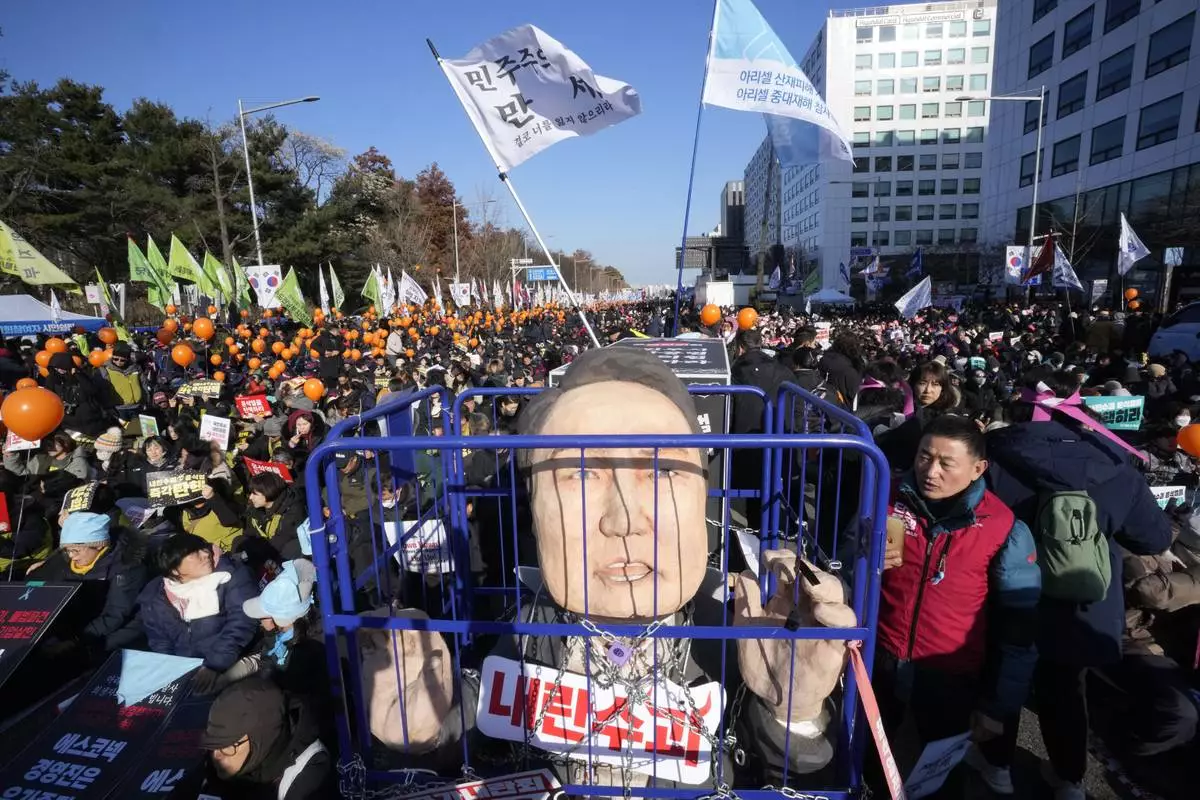
A caricature depicting an imprisoned South Korean President Yoon Suk Yeol is displayed before a rally to demand his impeachment outside the National Assembly in Seoul, South Korea, Saturday, Dec. 14, 2024. (AP Photo/Ahn Young-joon)
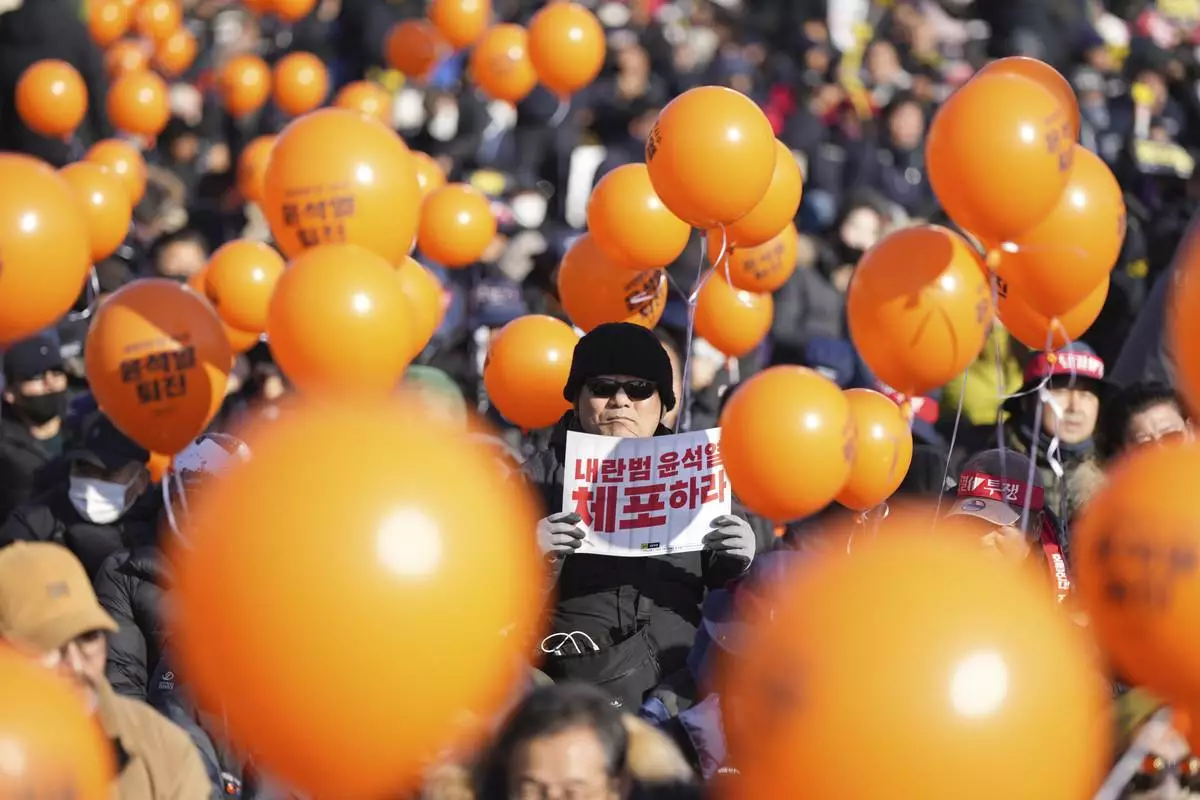
A man holds a sign reading "Arrest Yoon Suk Yeol" during a rally to demand South Korean President Yoon Suk Yeol's impeachment outside the National Assembly in Seoul, South Korea, Saturday, Dec. 14, 2024. (AP Photo/Lee Jin-man)
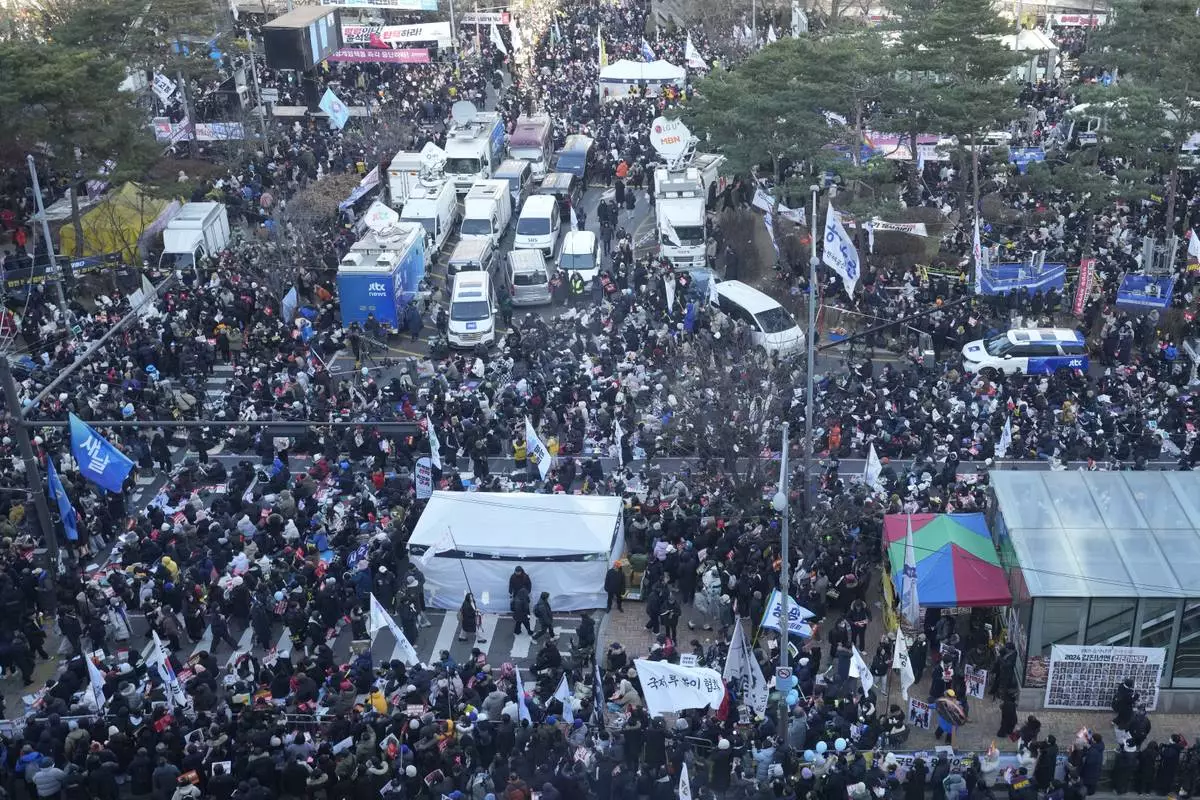
Participants gather during a rally to demand South Korean President Yoon Suk Yeol's impeachment outside the National Assembly in Seoul, South Korea, Saturday, Dec. 14, 2024. (AP Photo/Ahn Young-joon)
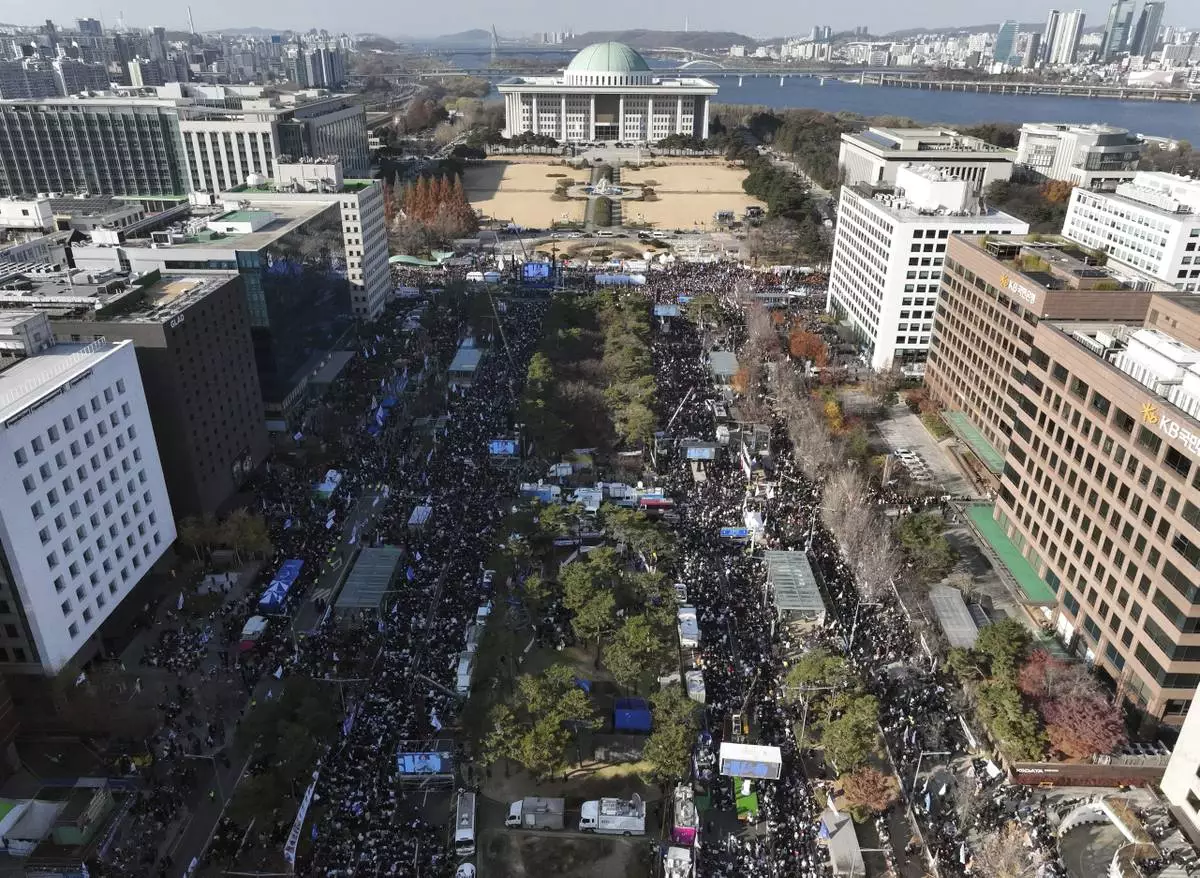
Participants gather during a rally to demand South Korean President Yoon Suk Yeol's impeachment outside the National Assembly in Seoul, South Korea, Saturday, Dec. 14, 2024. (Kim Do-hoon/Yonhap via AP)
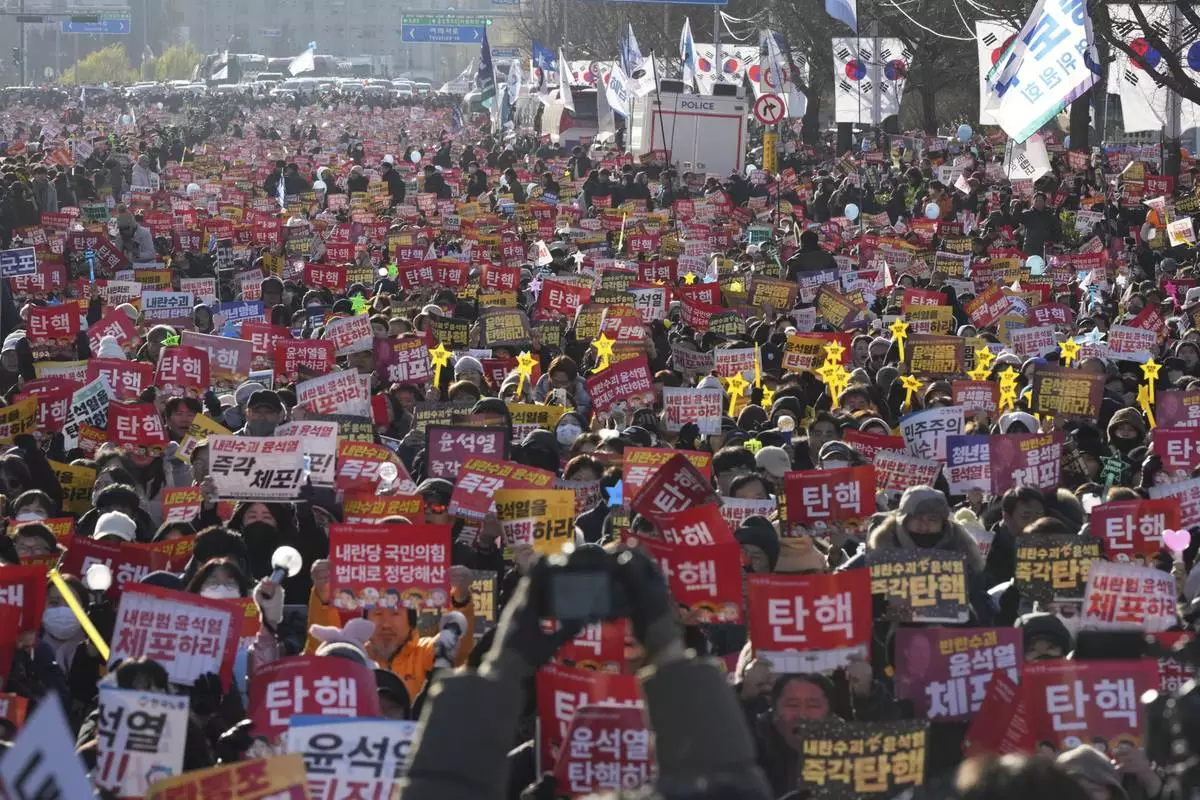
People shout slogans during a rally to demand South Korean President Yoon Suk Yeol's impeachment outside the National Assembly in Seoul, South Korea, Saturday, Dec. 14, 2024. The letters read "Impeachment." (AP Photo/Lee Jin-man)
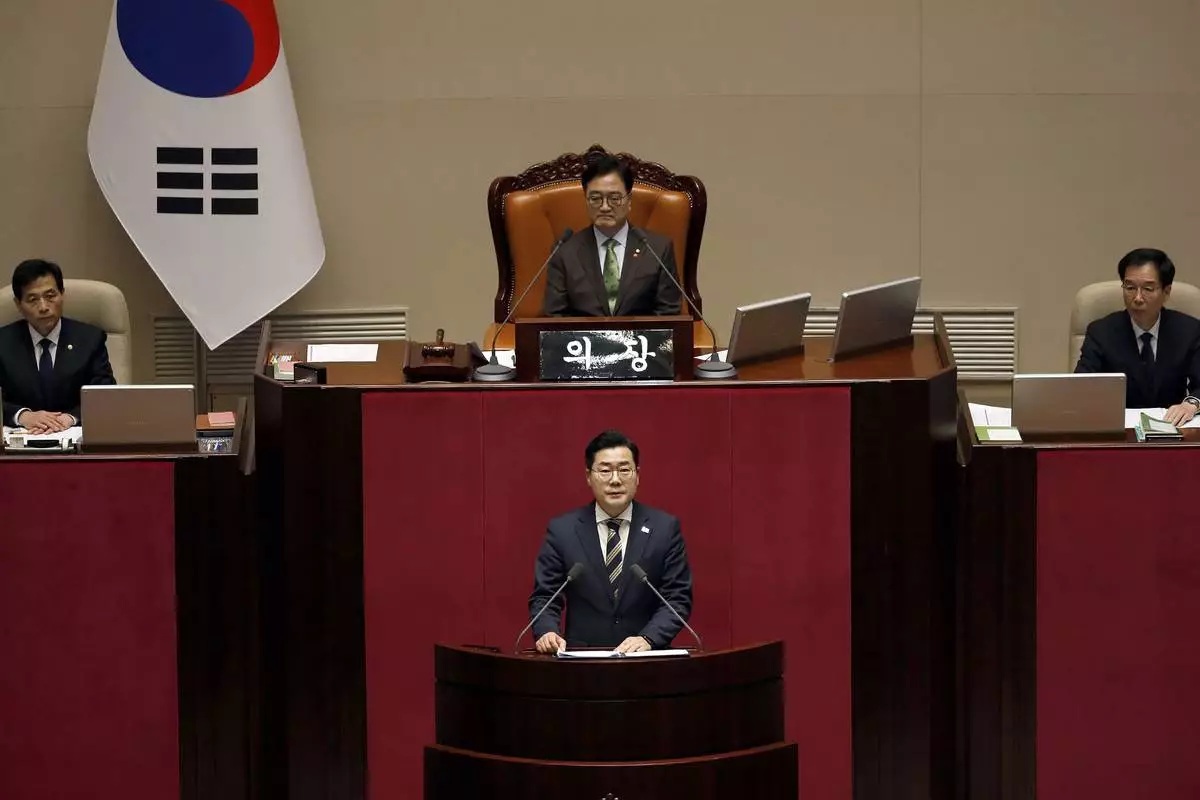
Park Chan-dae, floor leader of the Democratic Party, speaks during the plenary session for the impeachment vote of President Yoon Suk Yeol at the National Assembly in Seoul, South Korea, on Saturday, Dec.14, 2024.(Woohae Cho/Pool Photo via AP)
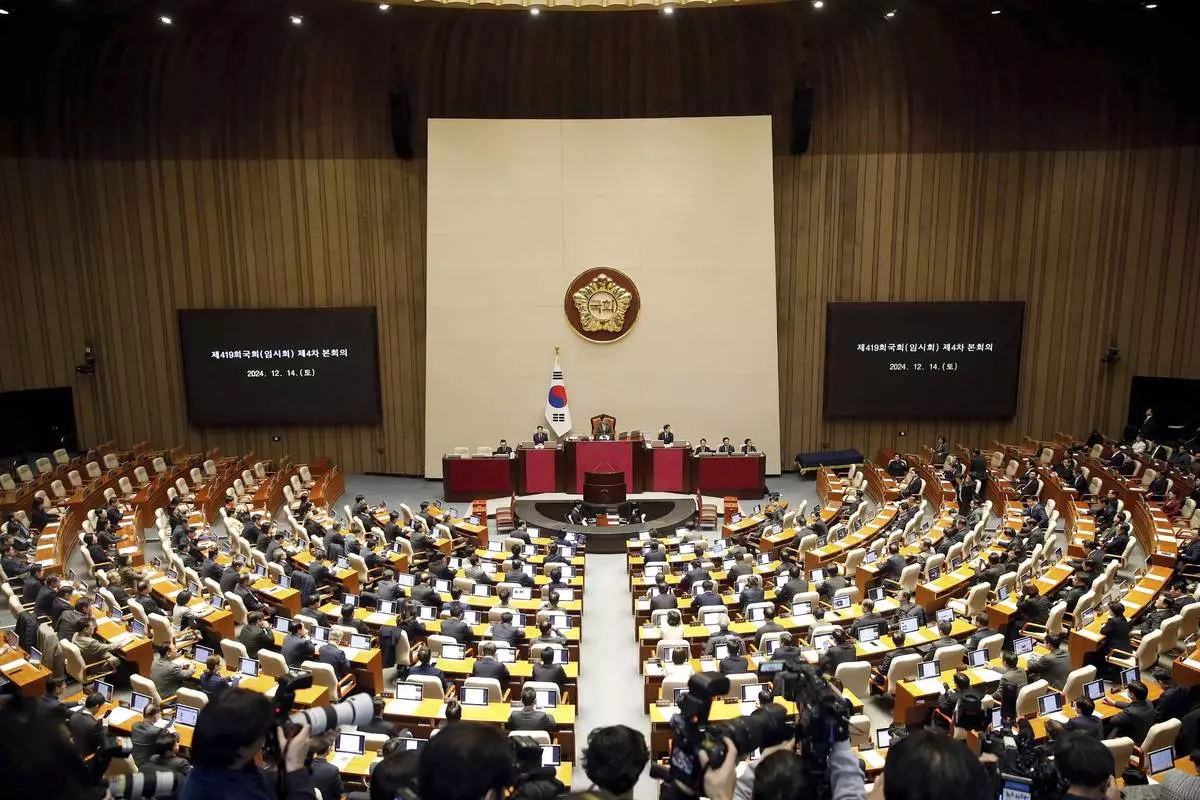
South Korean lawmakers attend plenary session of the impeachment vote of President Yoon Suk Yeol at the National Assembly in Seoul, South Korea, on Saturday, Dec. 14, 2024. (Woohae Cho/Pool Photo via AP)
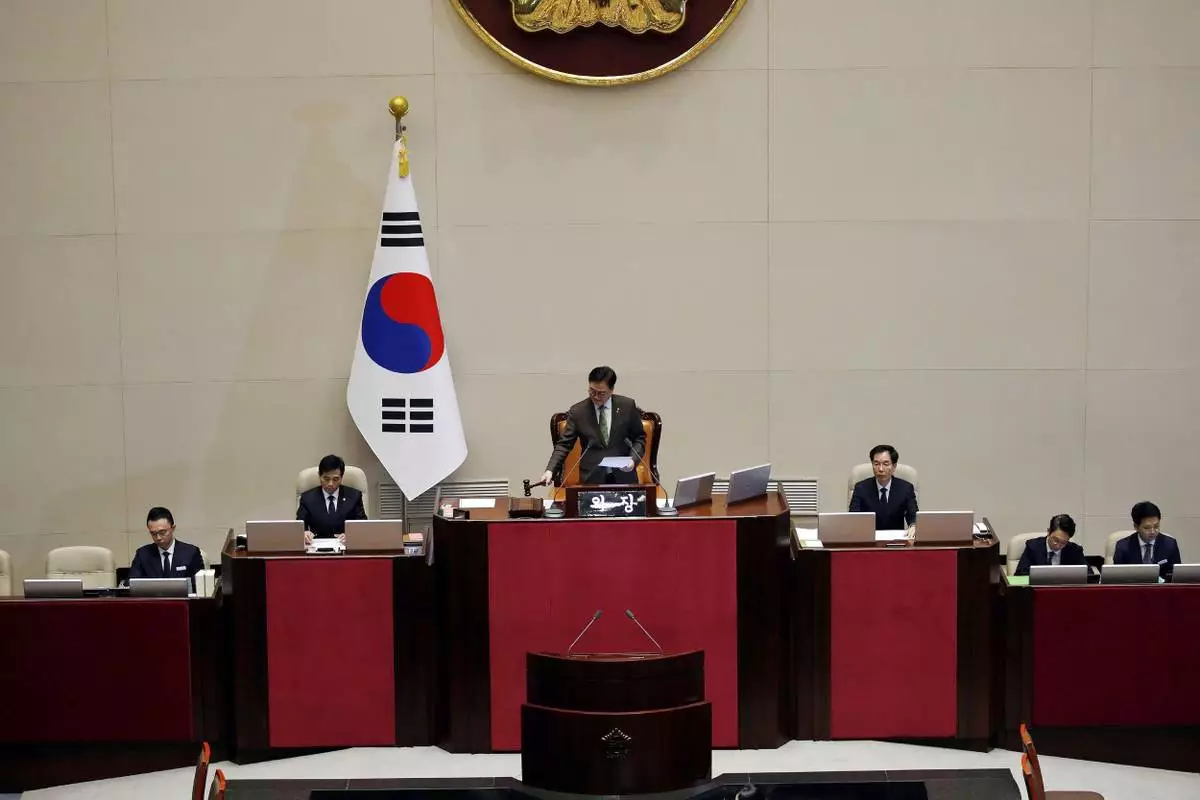
South Korean National Assembly Speaker Woo Won-shik, center, bangs with announcing the president impeachment after the impeachment vote of President Yoon Suk Yeol at the National Assembly in Seoul Saturday, Dec. 14, 2024. (Woohae Cho/Pool Photo via AP)
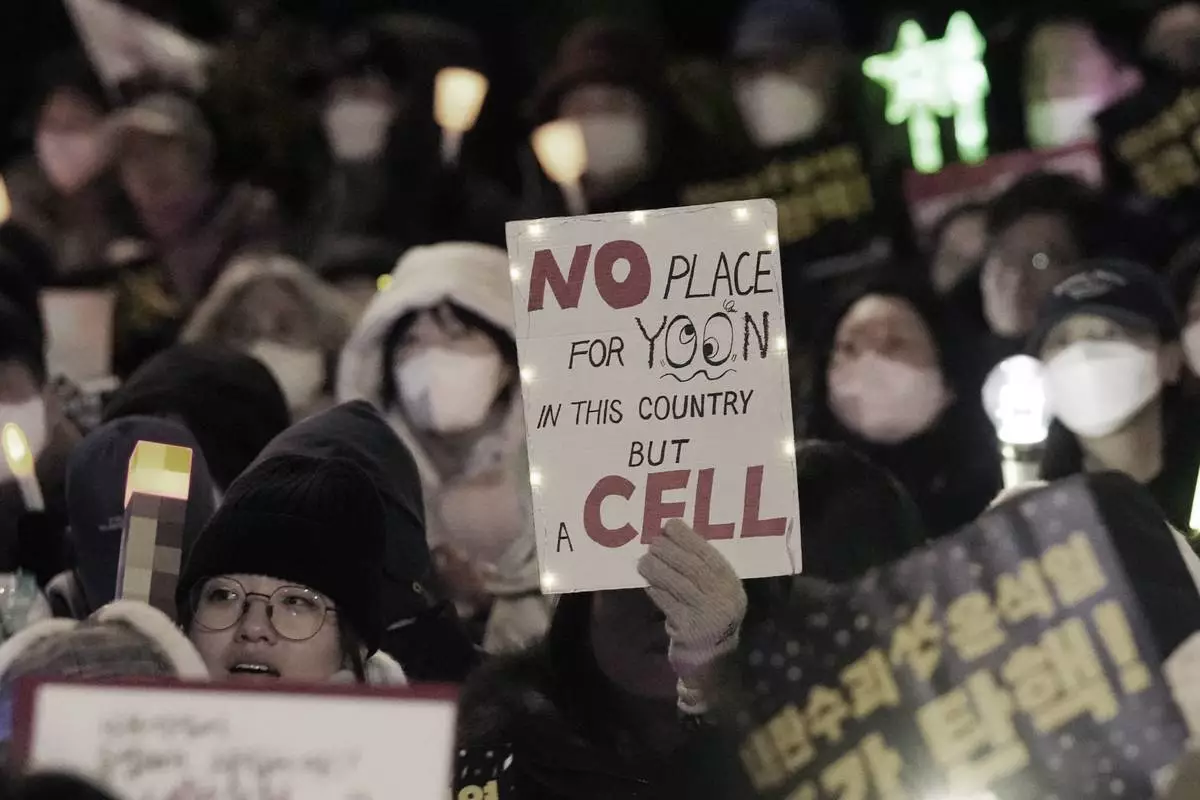
A participant holds a paper during a rally to demand South Korean President Yoon Suk Yeol's impeachment outside the National Assembly in Seoul, South Korea, Friday, Dec. 13, 2024. (AP Photo/Ahnn Young-joon)
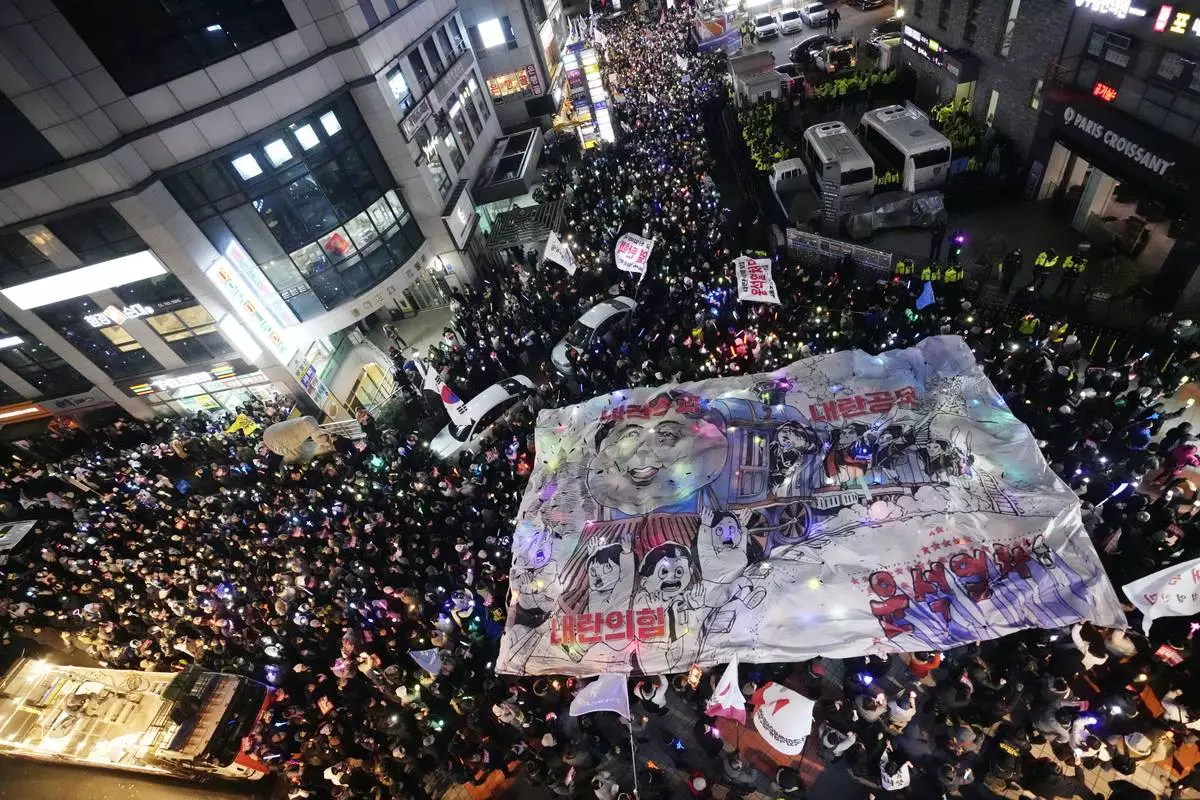
Participants hold a banner depicting South Korean President Yoon Suk Yeol's face on a cartoon train during a rally to demand his impeachment in front of the headquarters of the ruling People Power Party in Seoul, South Korea, Friday, Dec. 13, 2024. (AP Photo/Ahn Young-joon)
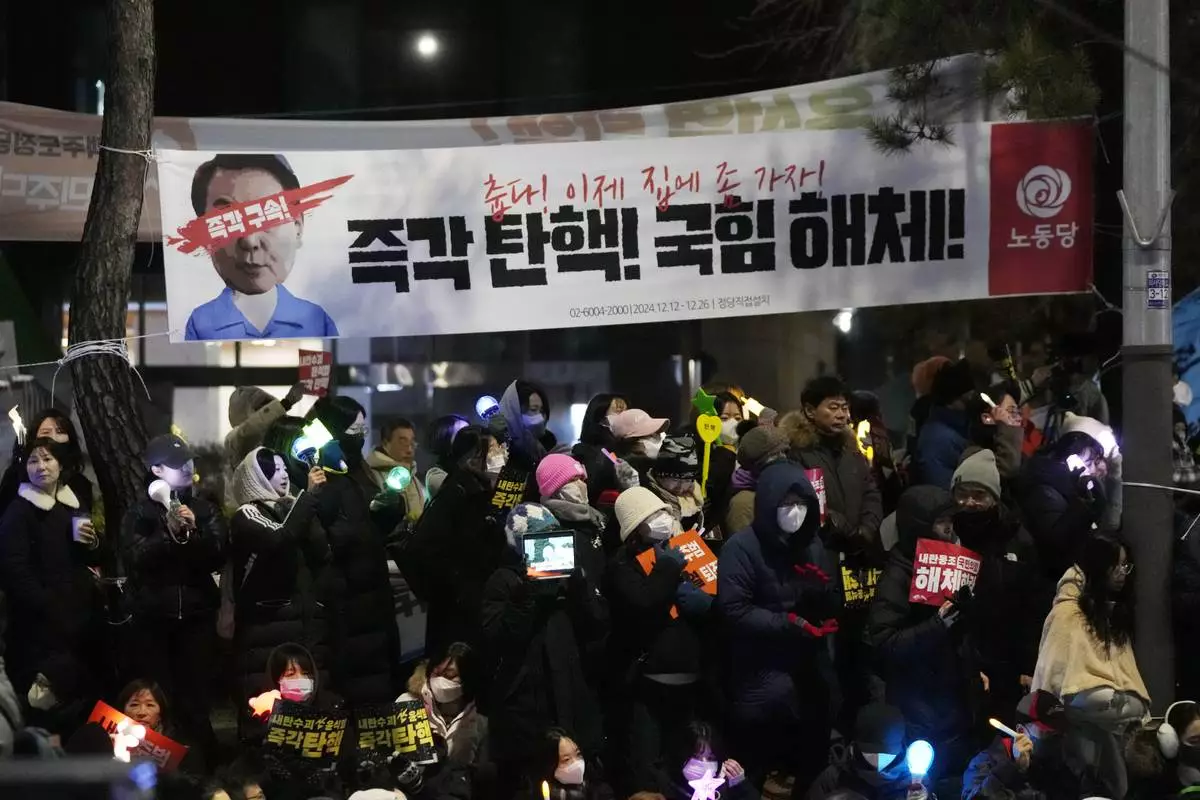
Participants attend a rally to demand South Korean President Yoon Suk Yeol's impeachment outside the National Assembly in Seoul, South Korea, Friday, Dec. 13, 2024. The signs read "Immediately impeachment, disband the ruling People Power Party." (AP Photo/Ahn Young-joon)

Participants tear a banner depicting South Korean President Yoon Suk Yeol's face on a cartoon train during a rally to demand his impeachment in front of the headquarters of the ruling People Power Party in Seoul, South Korea, Friday, Dec. 13, 2024. (AP Photo/Ahnn Young-joon)
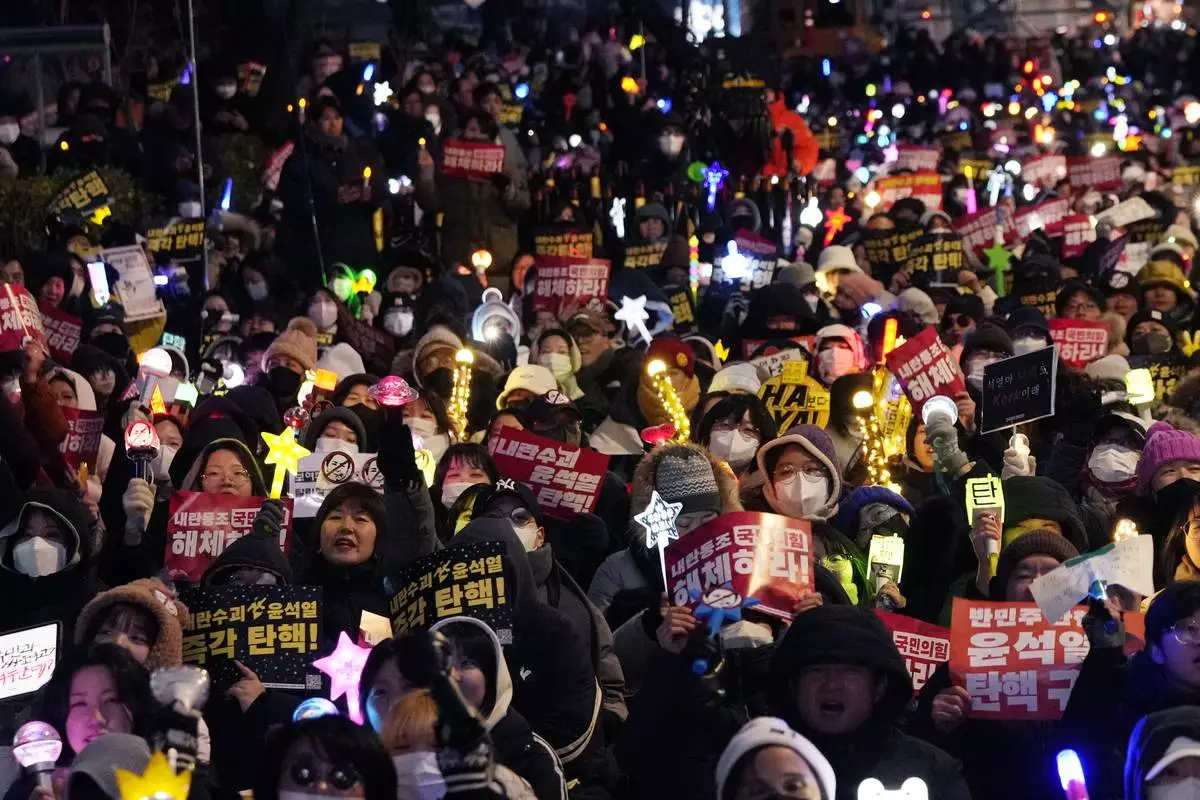
Participants stage a rally, to demand South Korean President Yoon Suk Yeol's impeachment, outside the National Assembly in Seoul, South Korea, Friday, Dec. 13, 2024. (AP Photo/Ahnn Young-joon)

Participants hold banners during a rally to demand South Korean President Yoon Suk Yeol's impeachment outside the National Assembly in Seoul, South Korea, Friday, Dec. 13, 2024. The signs read "Arrest and impeach the rebellion leader Yoon Suk Yeol." (AP Photo/Ahn Young-joon)
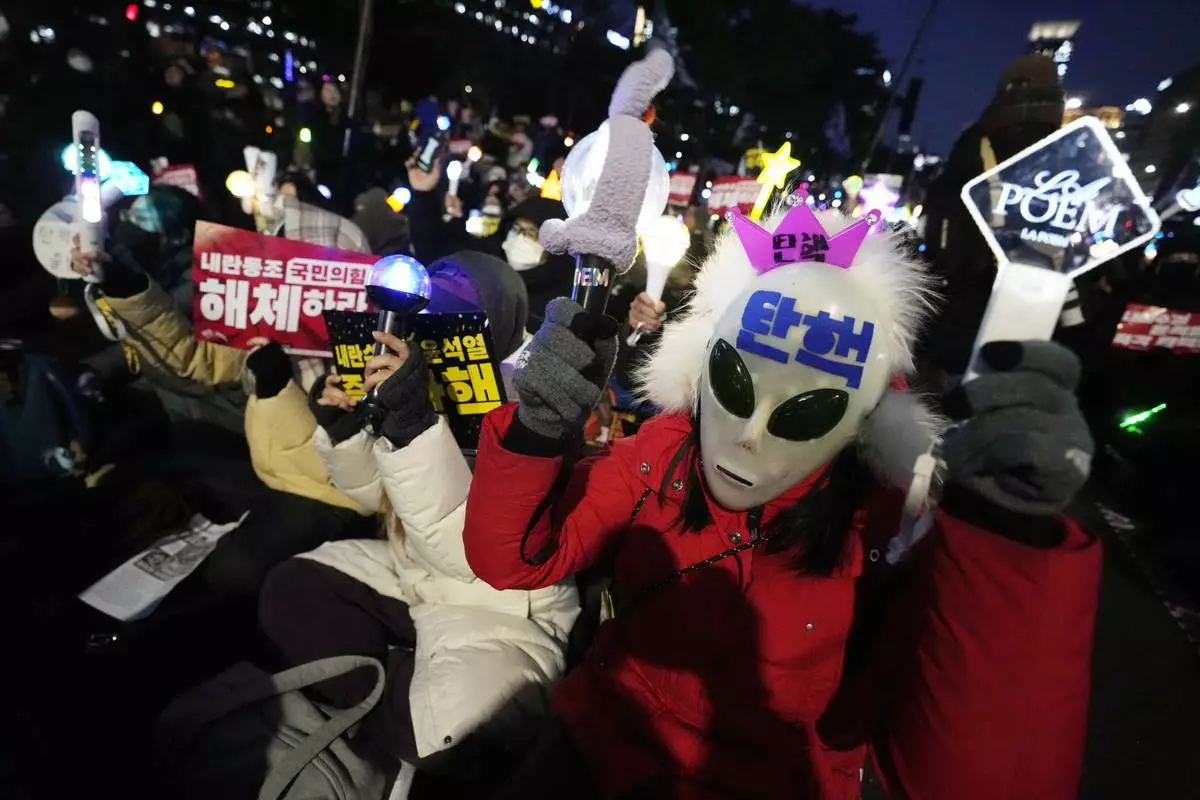
Participants attend a rally to demand South Korean President Yoon Suk Yeol's impeachment outside the National Assembly in Seoul, South Korea, Friday, Dec. 13, 2024. (AP Photo/Ahnn Young-joon)

Participants tear a banner depicting South Korean President Yoon Suk Yeol's face on a cartoon train during a rally to demand his impeachment in front of the headquarters of the ruling People Power Party in Seoul, South Korea, Friday, Dec. 13, 2024. (AP Photo/Ahn Young-joon)

Participants tear a banner depicting South Korean President Yoon Suk Yeol's face on a cartoon train during a rally to demand his impeachment in front of the headquarters of the ruling People Power Party in Seoul, South Korea, Friday, Dec. 13, 2024. (AP Photo/Ahn Young-joon)
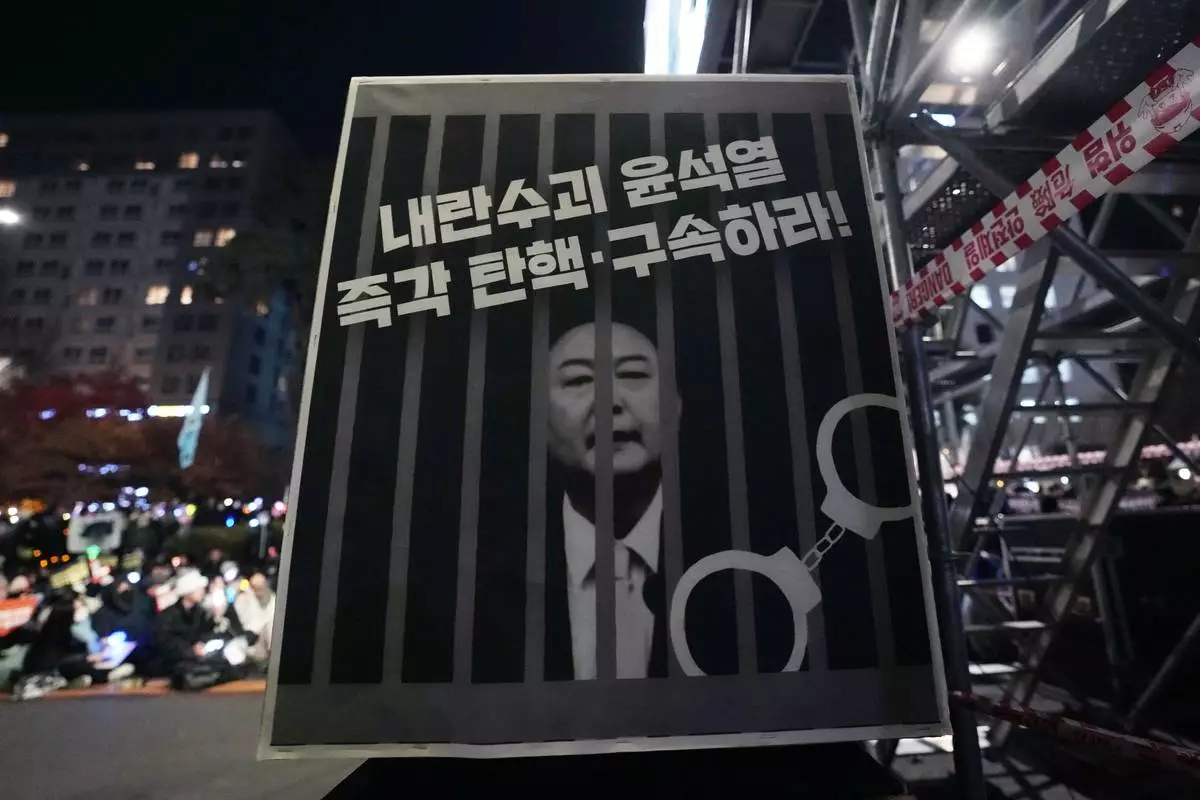
An image of depicting an imprisoned South Korean President Yoon Suk Yeol is displayed during a rally to demand his impeachment outside the National Assembly in Seoul, South Korea, Friday, Dec. 13, 2024. The signs read "Arrest and impeach the rebellion leader Yoon Suk Yeol." (AP Photo/Ahn Young-joon)

A caricature depicting an imprisoned South Korean President Yoon Suk Yeol is displayed during a rally to demand his impeachment outside the National Assembly in Seoul, South Korea, Friday, Dec. 13, 2024. (AP Photo/Ahnn Young-joon)



